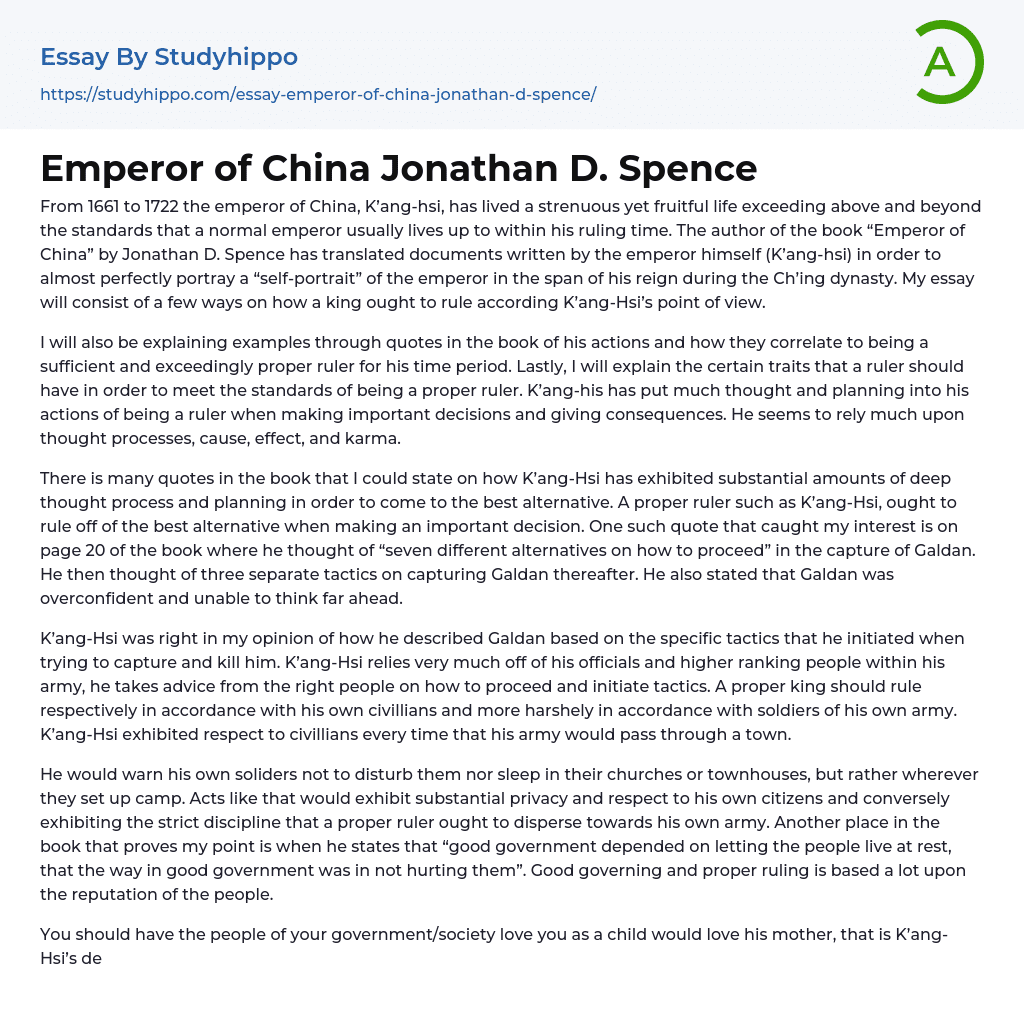From 1661 to 1722 the emperor of China, K’ang-hsi, has lived a strenuous yet fruitful life exceeding above and beyond the standards that a normal emperor usually lives up to within his ruling time. The author of the book “Emperor of China” by Jonathan D. Spence has translated documents written by the emperor himself (K’ang-hsi) in order to almost perfectly portray a “self-portrait” of the emperor in the span of his reign during the Ch’ing dynasty. My essay will consist of a few ways on how a king ought to rule according K’ang-Hsi’s point of view.
I will also be explaining examples through quotes in the book of his actions and how they correlate to being a sufficient and exceedingly proper ruler for his time period. Lastly, I will explain the cert
...ain traits that a ruler should have in order to meet the standards of being a proper ruler. K’ang-his has put much thought and planning into his actions of being a ruler when making important decisions and giving consequences. He seems to rely much upon thought processes, cause, effect, and karma.
There is many quotes in the book that I could state on how K’ang-Hsi has exhibited substantial amounts of deep thought process and planning in order to come to the best alternative. A proper ruler such as K’ang-Hsi, ought to rule off of the best alternative when making an important decision. One such quote that caught my interest is on page 20 of the book where he thought of “seven different alternatives on how to proceed” in the capture of Galdan. He then thought of three separate tactics o
capturing Galdan thereafter. He also stated that Galdan was overconfident and unable to think far ahead.
K’ang-Hsi was right in my opinion of how he described Galdan based on the specific tactics that he initiated when trying to capture and kill him. K’ang-Hsi relies very much off of his officials and higher ranking people within his army, he takes advice from the right people on how to proceed and initiate tactics. A proper king should rule respectively in accordance with his own civillians and more harshely in accordance with soldiers of his own army. K’ang-Hsi exhibited respect to civillians every time that his army would pass through a town.
He would warn his own soliders not to disturb them nor sleep in their churches or townhouses, but rather wherever they set up camp. Acts like that would exhibit substantial privacy and respect to his own citizens and conversely exhibiting the strict discipline that a proper ruler ought to disperse towards his own army. Another place in the book that proves my point is when he states that “good government depended on letting the people live at rest, that the way in good government was in not hurting them”. Good governing and proper ruling is based a lot upon the reputation of the people.
You should have the people of your government/society love you as a child would love his mother, that is K’ang-Hsi’s description of a proper king. The past few quotes that I stated on how a king ought to rule creates my basis for the certain traits that a king should have in order to be a proper ruler. A
proper ruler should exhibit discipline towards his army, respect among citizens, patience and thought when making important decisions, and reputation. A proper ruler shouldn’t base their reputation solely on the consent of the governed, but rather of higher ranking officials and enemies.
- Bangladesh essays
- China essays
- Hong Kong essays
- India essays
- Japan essays
- Kuala Lumpur essays
- Malaysia essays
- Manila essays
- Pakistan essays
- Philippines essays
- Singapore essays
- Vietnam essays
- Vietnamese essays
- American Civil War essays
- Atomic Bomb essays
- Attack essays
- Cold War essays
- Crimean War essays
- Diplomacy essays
- Emilio Aguinaldo essays
- Emperor essays
- Hitler essays
- Iraq War essays
- Korean War essays
- Mexican American War essays
- Nazism essays
- Nuclear Weapon essays
- Philippine Revolution essays
- Revolutionary War essays
- Rwanda essays
- The Spanish American War essays
- Trench Warfare essays
- Tribe essays
- Vietnam War essays
- War of 1812 essays
- Western Front essays
- World War I essays
- World War Ii essays




